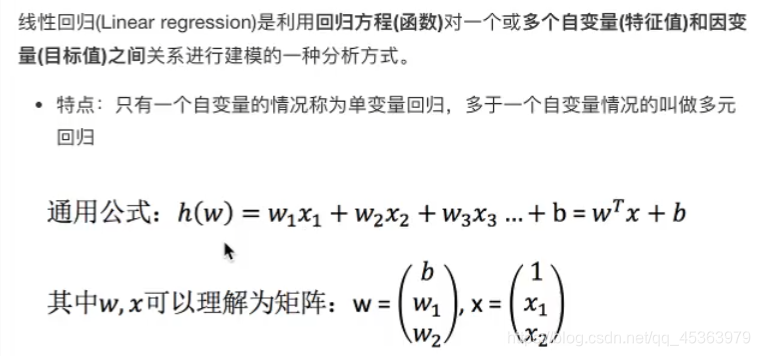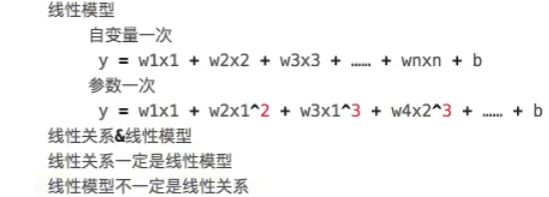4.1 线性回归
回归问题:目标值-连续型的数据。
4.1.1什么是线性回归
- 定义与公式:
找到函数关系,表示特征值和目标值,该函数就是线性模型

2.线性回归中线性模型有两种,一种是线性关系,一种是非线性关系。
单特征值与目标值的关系成直线关系,多特征值与目标值呈平面关系。


非线性关系:

- 线性模型包括线性关系和非线性关系两种
- 线性模型包括参数一次幂和自变量一次幂 线性关系一定是线性模型, 反之不一定
- 优化方法有两种: 一种是正规方程, 第二种是梯度下降

4.1.2 线性回归的损失和优化原理
目标求模型参数。
- 损失函数

- 优化方法
1)正规方程-直接求解W

2)梯度下降-不断试错,不断改进

3)对比


4.1.3 API

4.1.4 波士顿房价案例


1)获取数据集
2)划分数据集
3)特征工程:无量纲化-标准化
4)预估器流程:fit() -> 模型 coef_intercept_
5)模型评估
利用均方根误差来进行回归模型评估。

# 线性模型包括线性关系和非线性关系两种
# 线性模型包括参数一次幂和自变量一次幂
# 线性关系一定是线性模型, 反之不一定
# 优化方法有两种: 一种是正规方程, 第二种是梯度下降
# 这部分用来训练预测房价
from sklearn.linear_model import LinearRegression, SGDRegressor
from sklearn.datasets import load_boston
from sklearn.model_selection import train_test_split
from sklearn.preprocessing import StandardScaler
from sklearn.metrics import mean_squared_error # 均方误差
def load_data():
boston_data = load_boston()
print("特征数量为:(样本数,特征数)", boston_data.data.shape)
x_train, x_test, y_train, y_test = train_test_split(boston_data.data,
boston_data.target, random_state=22)
return x_train, x_test, y_train, y_test
# 正规方程
def linear_Regression():
"""
正规方程的优化方法
不能解决拟合问题
一次性求解
针对小数据
:return:
"""
x_train, x_test, y_train, y_test = load_data()
transfer = StandardScaler()
x_train = transfer.fit_transform(x_train)
x_test = transfer.transform(x_test)
estimator = LinearRegression()
estimator.fit(x_train, y_train)
print("正规方程_权重系数为: ", estimator.coef_)
print("正规方程_偏置为:", estimator.intercept_)
y_predict = estimator.predict(x_test)
error = mean_squared_error(y_test, y_predict)
print("正规方程_房价预测:", y_predict)
print("正规方程_均分误差:", error)
return None
# 梯度下降
def linear_SGDRegressor():
"""
梯度下降的优化方法
迭代求解
针对大数据
:return:
"""
x_train, x_test, y_train, y_test = load_data()
transfer = StandardScaler()
x_train = transfer.fit_transform(x_train)
x_test = transfer.transform(x_test)
# 建议看下这个函数的api, 这些值都是默认值
# estimator = SGDRegressor(loss="squared_loss", fit_intercept=True, eta0=0.01,
# power_t=0.25)
estimator = SGDRegressor(learning_rate="constant", eta0=0.01, max_iter=10000)
# estimator = SGDRegressor(penalty='l2', loss="squared_loss") # 这样设置就相当于岭回归, 但是建议用Ridge方法
estimator.fit(x_train, y_train)
print("梯度下降_权重系数为: ", estimator.coef_)
print("梯度下降_偏置为:", estimator.intercept_)
y_predict = estimator.predict(x_test)
error = mean_squared_error(y_test, y_predict)
print("梯度下降_房价预测:", y_predict)
print("梯度下降_均分误差:", error)
return None
if __name__ == '__main__':
linear_Regression()
linear_SGDRegressor()
